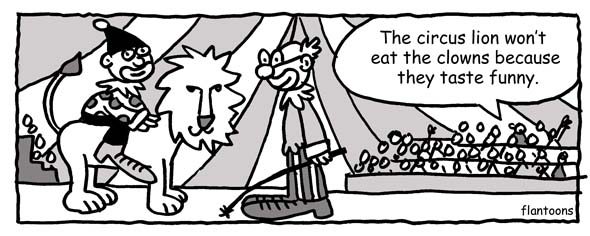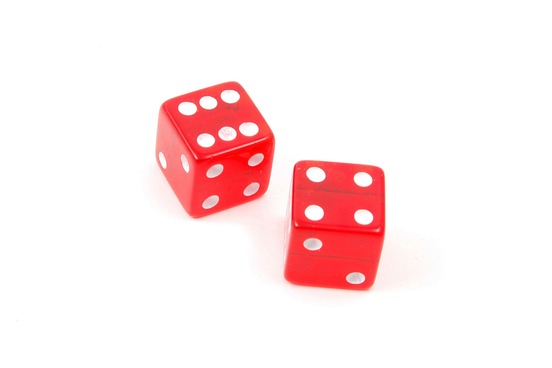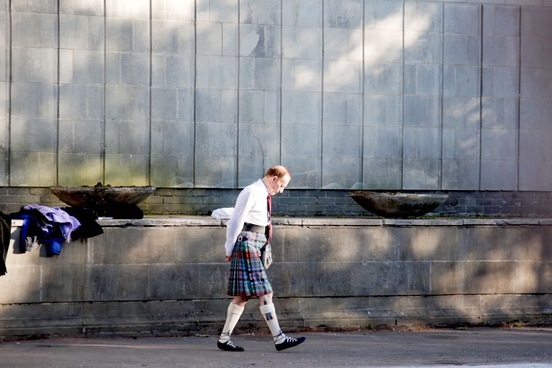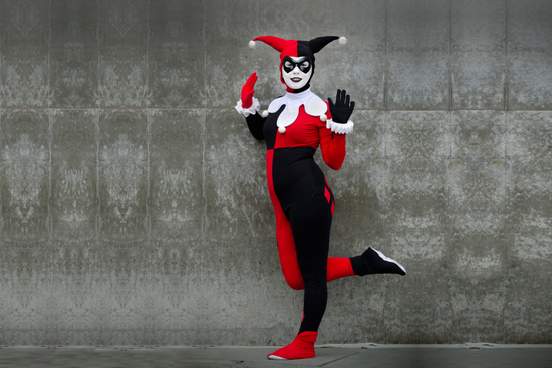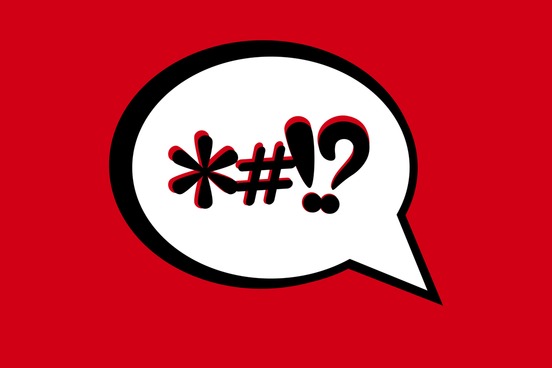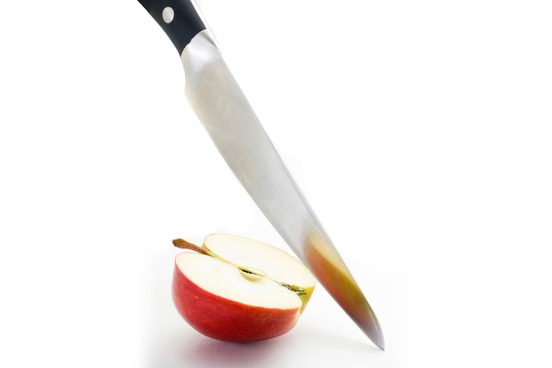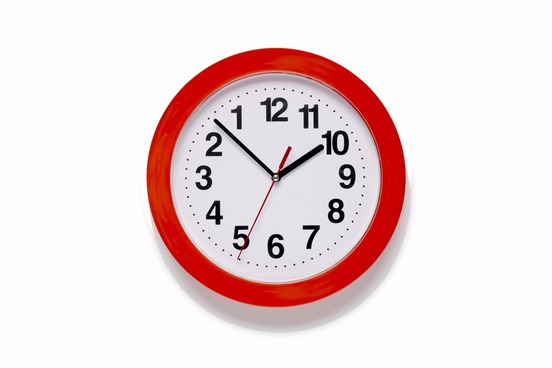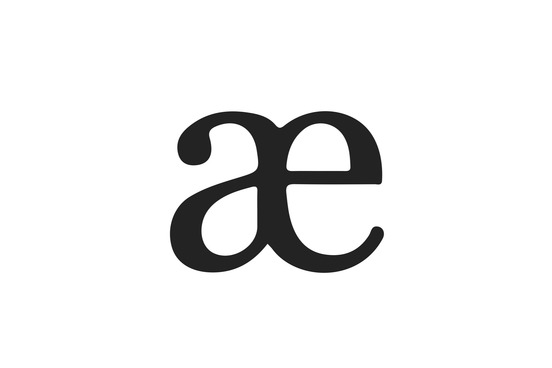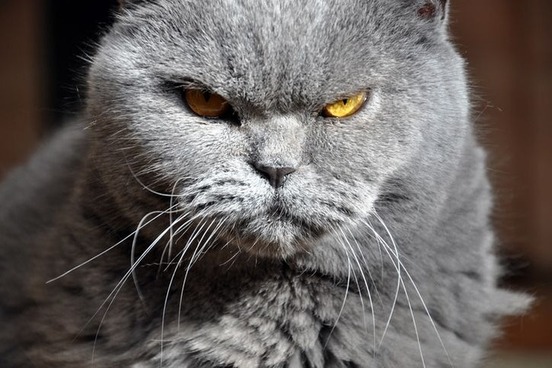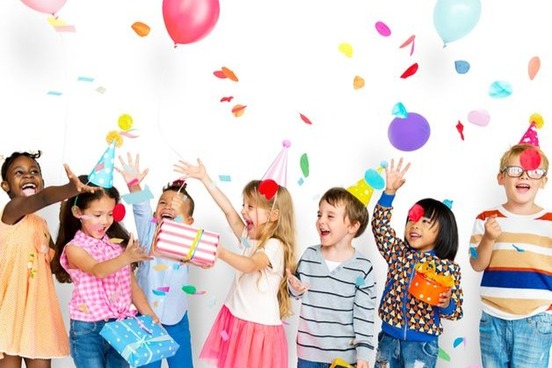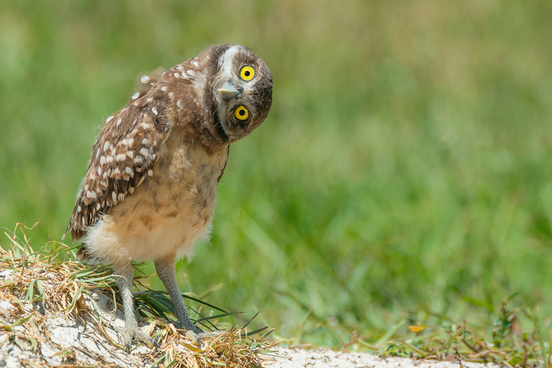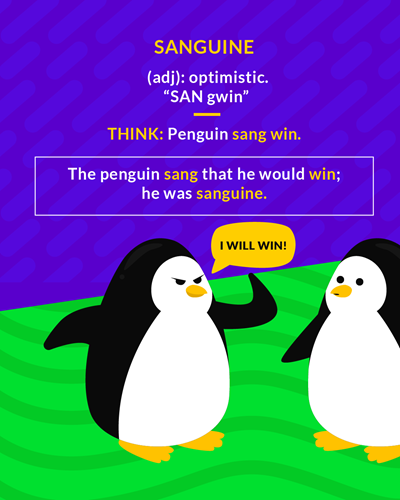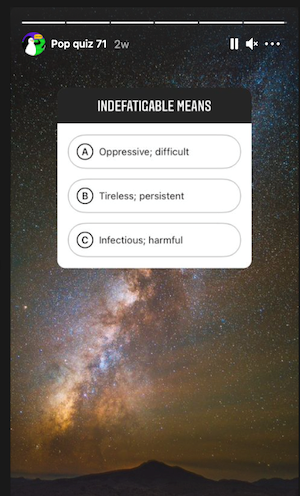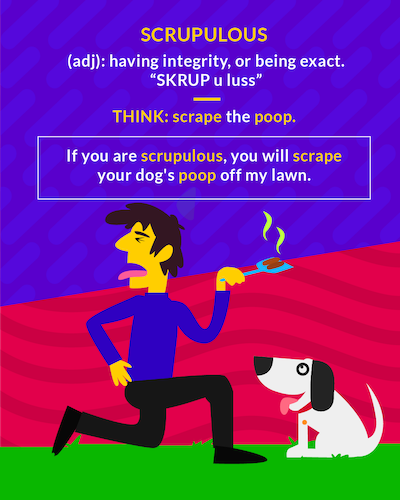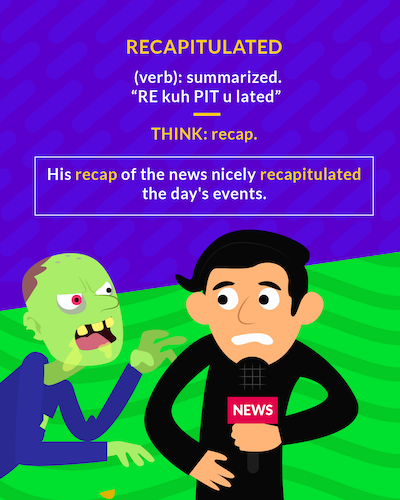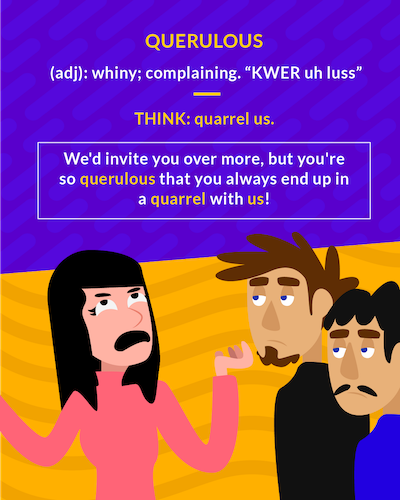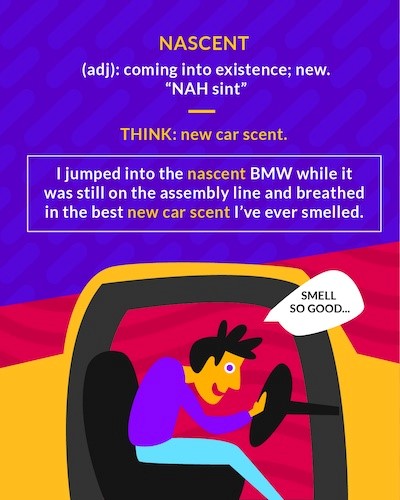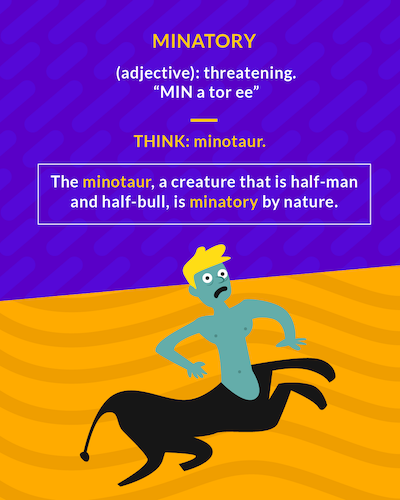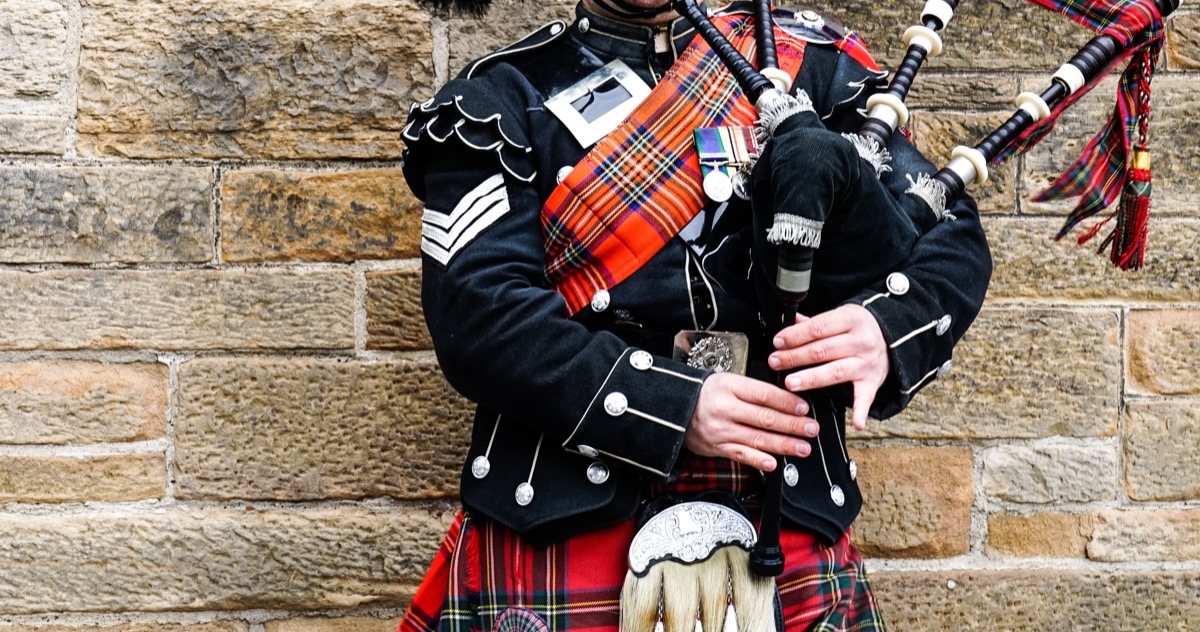funny
(adjective)
/ˈfʌni/
LISTEN

Funny is an adjective with more than just the obvious meaning. It refers to something that causes laughter and amusement, but it is also used when something is strange and curious, or suspicious and deceitful. Informally it also means ‘slightly ill,’ and in British English it can be used to talk about someone who is a bit crazy.
Example sentences
- He’s such a funny guy. I always have a great time with him!
- The washing machine is making a funny noise.
- There’s something funny about that man; we shouldn’t trust him.
- Jennifer was feeling funny, so she didn’t go to work.
- Grandpa started getting a bit funny as he grew older.
Words often used with funny
funny business (noun): something suspicious. Example: “I saw James in a restaurant with a woman who wasn’t his wife. There’s some funny business going on there if you ask me.”
very funny (interjection): we use this ironically to say that we think someone is making a joke, but we don’t find the joke funny at all. Example: “I spent all of our money at the casino.” “Very funny.”
get funny with someone (expression, UK): be insolent. Example: “Don’t get funny with me, young lady!”
In pop culture
Listen to Queen singing “Funny how love is” here:
Additional information
The funnies are the comic strips in newspapers.
Origin
Funny can be used to describe something strange, but not too serious. Because it can also mean ‘amusing,’ people might be offended if you said a strange accident where someone was seriously hurt was funny, but you can use it for anything that didn’t have any harmful or upsetting consequences: “It’s funny that he didn’t show up to the party; he said he was coming.” Or “We studied at the same university, at the same time; how funny that we never met!”
Other forms
funnily (adverb); funniness (noun)
Origin
Funny, meaning ‘humorous,’ dates back to the mid-18th century, and is formed by adding a –y to the word fun, to make it an adjective (it used to be only a noun). Fun dates back to around the year 1700. Its original meaning, ‘a cheat or trick,’ gave way to the sense ‘amusement or diversion’ (from which funny evolved) in the early 18th century. Its origin is uncertain, but some linguists think it evolved from the Middle English adjective fon or fonne (foolish) and verb fonnen (to make a fool of someone), probably from a Germanic origin, meaning fun and funny would be related to the Swedish fånig (foolish) and fåne (a fool), the Norwegian fomme or fume (a fool), and the English adjective fond. Other linguists think the Middle English verb fonnen came from the Old Frisian fonna, fone or fomne, variant forms of fāmne or fēmne (young woman or virgin), and can be traced back to the Proto-Germanic faimnijo (maiden), and the Proto-Indo-European root peymen– (girl) or poymen– (breast milk). If this is the case, fun and funny are related to the West Frisian famke (girl), the Saterland Frisian fone or fon (‘woman, maid or servant,’ as well as ‘weakling or simpleton’), the Latin femella (a young female or girl) and femina (a woman), and English words such as female and feminine. Funny has been used to mean ‘strange, odd or perplexing’ since the early 19th century; this sense is thought to have first appeared in the south of the US. Comic strips in the newspaper have colloquially been called the funnies since the mid-19th century.
Word of the Day is released Monday through Friday.

Mon, 08/06/2012 — 06:40 — Chris McCarthy
When something is funny it makes us laugh. For example, a comedy movie is funny or a joke is funny.
Funny is also used to describe something that is strange or unusual.
«Don’t drink that milk, it tastes funny.»
«My car has been making a funny noise recently.»
«That’s funny. I’m sure I closed that window.»
Bookmark/Search this post with:
Did you know the English language is the most complicated language to learn as a second language (Japanese is a close second)? Not so surprising when you think about words like, they’re, there and their. And not to mention the confusing plural nouns, like goose is geese, but moose as a plural is moose. To celebrate the beauty, the sophistication and the history of the English language there is even a holiday on April 23rd each year named English Language day (which is also William Shakespeare day – The famous English writer). While there are millions of brilliant words in the English Language, today we look at over 100 of the funniest words in the English language. I hope you love them, as much as I do!
Funny Words starting with A:
- Abibliophobia: The fear of running out of reading materials to read.
Sentence: I have so many reading materials in my house, anyone would think that I have Abibliophobia or something!
- Abozzo: A rough sketch of a drawing or a draft poem.
Sentence: I’m almost finished with my abozzo of the Eiffel tower.
- Ama: Japanese diver who dives for pearls or food.
Sentence: Amas have been diving for pearls in the Japan region for many years.
- Araba: A carriage or coach used in Turkey.
Sentence: I’m taking the araba through the city today.
- Argle-bargle: A lot of commotion or a row happening.
Sentence: What’s all this argie-bargie about?
- Aye-aye: A type of lemur which can be found in Madagascar.
Sentence: The aye-ayes are such cute little creatures.
Starting with B:
- Bamboozled: To trick or confuse someone.
Sentence: I have been bamboozled again by you.
- Blubber: This word has two meanings: It can mean to cry very loudly or could refer to excess body fat.
Blubber Sentence: Please, stop your blubbering.
- Brouhaha: An event which involves great excitement or loud confusion.
Brouhaha in a sentence: Last night’s event was such a brouhaha and nothing was achieved.
- Bumbershoot: A Bumbershoot is an old-fashioned word for an umbrella.
Bumbershoot in a sentence: Don’t forget your Bumbershoot, dear.
- Bumfuzzle: This refers to being confused.
Bumfuzzle in a Sentence: I’m completely bumfuzzled!
Starting with C:
- Cantankerous: Someone who is very grumpy.
Sentence: Our neighbour is such a Cantankerous.
- Catawampus: Something positioned diagonally.
Sentence: To get to the school, you need to walk catawampus across that park over there.
- Collywobbles (kol-ee-wob-uh lz): This is the feeling when you have a stomach ache or when you feel really nervous or scared.
Collywobbles in a sentence: This place gives me the collywobbles, let’s go!
Hilarious Words Starting with D:
- Dingy: Something that is dark and dull.
Sentence: This house looks a little dingy to me.
- Donnybrook: This refers to a fight, riot or a big brawl.
Donnybrook in a sentence: A Donnybrook broke out last night when the police when to arrest the leader of the operation.
- Doozy: Something that is really great.
Sentence: I’m having a doozy of a time at this party.
- Dweeb: This is not a nice word to call someone. It means that you think the person is boring and uninteresting.
Sentence: No-one wants to be a dweeb.
Funny Words That Start With E:
- Egad: Used as an expression of shock or amazement.
Sentence: Egad! I never thought of that!
- Eep: Another expression of surprise or fear.
Sentence: Eep! That was scary!
- Epos: Could refer to an epic poem or something that is epic.
Sentence: That poem was just epos!
Starting with F:
- Filibuster: Somone who refusing to give up the floor in a debate to prevent a vote.
Sentence: Someone get that silly filibuster out of here now!
- Flibbertigibbet (flib·ber·ti·gib·bet): Is a word used to describe someone who talks a lot or is very gossipy.
Flibbertigibbet in a sentence: Imagine sitting on a 12-hour flight with a flibbertigibbet next to you.
- Flabbergasted: To be surprised or shocked by something.
Sentence: I’m just flabbergasted to hear that.
- Formication: The feeling that ants are crawling on your skin.
Sentence: Her constant shivering could be described as a formication.
- Fuddy-duddy: Someone who is a mild-mannered person.
Sentence: He can be such a fuddy-duddy sometimes.
Starting with G:
- Gaberlunzie: A beggar that walks around town to town.
Sentence: He didn’t really have a profession, some may even call him a gaberlunzie.
- Gardyloo (gahr-dee-loo): This is a disgusting one. It refers to the cry people use to shout when they would throw their slops or droppings out of the window.
Gardyloo in a Sentence: Watch out, Gardyloo coming!
- Gazump: This word really has a specific meaning. It means to refuse to sell your house to someone who you previously agreed to sell your house to.
Sentence: I’m so happy my offer to buy the house next door was accepted, but what if I get gazumped?
- Gobbledygook: Speaking Nonsense.
Sentence: Why do you always have to speak such Gobbledygook?
- Goombah: An older friend who protects you.
Sentence: Jamie didn’t have many friends, but was glad that his grandpa could be his protector – His Goombah.
- Gubbins: These are objects of very little value like rubbish or litter.
Gubbins in a sentence: No one’s going to buy your gubbins.
Starting with H:
- Hairball: A ball of hair that a cat normally chokes out.
Sentence: Cats are cute, but I hate it when they throw-up hairballs everywhere.
- Hocus-pocus: A trick or magical spell.
Sentence: What’s all this hocus-pocus about?
- Hokey: Something is is silly or old-fashioned.
Sentence: Now that was hokey old movie to watch!
- Hootenanny: A country music party or get-together.
Sentence: I’m going to an old-fashioned Hootenanny on Saturday, would you like to come?
- Heckler: Someone who interrupts a public performance with offensive comments.
Sentence: Those footballers are always having to deal with hecklers at their matches.
Starting with I:
- Itty-Bitty: Something that is really small or tiny.
Sentence: That ladybird is so itty-bitty.
- Ickle: Something that is small and normally cute
Sentence: Look at that ickle baby dolphin!
- izzat: This relates to your personal respect and dignity.
Sentence: I’m afraid of saying that in public, as it’ll be against my izzat.
Starting with J:
- Jabberwock: Something that is complete nonsense or gibberish
Sentence: Everything he just said was complete Jabberwock.
- Jazzetry: The reading of poetry which is accompanied by jazz.
Sentence: I love reading poems, but I’ve never tried jazzetry.
- Jink: The sudden change in direction.
Sentence: He jinked out of the way, as the ball came towards him.
Fun Words Starting with K:
- Kagu: An blueish-greyish type of bird which is now an endangered species.
Sentence: The rare Kagu can be found in the Pacific island of New Caledonia.
- Kaka: A breed of parrot that can be found in New-Zealand.
Sentence: The kaka parrots are so cool!
- Kebbie: A Scottish term relating to a walking stick with a hooked end.
Sentence: Pass the old man his keebie.
- Kibble: Ground meal or gains used as animal feed.
Sentence: The chickens love this new brand of kibble.
- Kraken: A mythical sea creature.
Sentence: Just like the loch ness monster, the Kraken is a myth.
Starting with L:
- La-di-da: If you described someone as “La-di-da”, you are suggesting that they are upper-class or behaving unnaturally only to impress other people.
La-di-da in a sentence: She thinks she is all La-di-da, but I know what she’s really like.
- Lol: Short for laughing out loud. Mosting used on social media and in text messages.
Sentence: Lol – That’s so funny!
- Lollygagger: Someone who walks around with no aim or goal.
Sentence: They spent their summer lying about, eating and general lollygagging.
- Lickety-split: When something moves really fast.
Sentence: He was out of the door lickety-split.
Starting with M:
- Malarkey: An informal word for talking about meaningless things or nonsense.
Malarkey in a sentence: This is all malarkey, I tell ya!
- Moist: Something that is slightly wet.
Sentence: This blanket seems a little moist to sit on.
- Mollycoddle: To be extra nice to someone or to overprotect them.
Sentence: Sometimes what a child needs is some tough love and not mollycoddling all the time.
Starting with N:
- Nacket: A light lunch or snack.
Sentence: I’m going to have a quick nacket before dinner.
- Namby-pamby: Someone who is weak, with no backbone.
Sentence: I don’t want to be some namby-pamby little girl!
- Napoo: The end of something. A term mostly used by soldiers.
Sentence: Napooh! That’s the end of that story.
- Niff: Something that smells bad.
Sentence: It’s got that horrible fishy niff.
- Nincompoop: This refers to someone who is not intelligent or a fool.
Nincompoop sentence: You act like such a nincompoop sometimes.
Starting with O:
- Obi: A sash worn around the waist of a kimono.
Sentence: That pink obi would look nice with this kimono.
- Oozy: Something that is slimy and wet
Sentence: That table is dripping in ooze.
- Oompah: The sound of deep brass instruments in a band.
Sentence: The oompah music in the background really set the tone.
Starting with P:
- Panjandrum: Someone who thinks that they are superior to others.
Sentence: She’s no queen, but she saw acts like a panjandrum.
- Patroon: The captain of a ship
Sentence: Look sharp, the patroon will be here soon.
- Pettifogger: A pettifogger is someone who deals with small or petty businesses. It can also be to argue over small, unimportant matters.
Pettifogger in a sentence: Why do you look up to such a pettifogger?
Starting with Q:
- Quab: Something that is incomplete or immature
Sentence: That baby bird is still just a quab.
- Quark: Scientific term used to describe atoms which are made up of smaller particles.
Sentence: Understanding quarks of fundamental to the world of physics.
- Quoz: Something that is strange.
Sentence: That’s so quoz! No-one wants to eat cheese and ice-cream together!
Silly Words Starting with R:
- Ratoon: This refers to the small root that sprouts from a plant, especially during the springtime.
Sentence: I heard somewhere that ratooned plants grow taller and healthier.
- Rugrat: Refers to a young child or toddler
Sentences: Those rugrats don’t know what’s coming to them!
- Ruddy: The term sometimes can be used to suggest good health in a person.
Sentence: That ruddy-faced girl was someone I never seen before.
Starting with S:
- Sialoquent: Somone who splits while talking.
Sentence: My old science teacher was Sialoquent. I was always scared to go near him!
- Skedaddle: To ask some to leave or run away very quickly
Skedaddle in a sentence: This is no place to play your silly games, now skedaddle before I get you!
- Skullduggery Refers to dodgy dealings and some no good business.
Sentence: We need to put a stop to all this skullduggery around this town.
- Shenanigan: This is when someone is causing a lot of mischiefs or playing tricks.
Shenanigans in a sentence: What’re all the shenanigans about?
- Snollygoster (snol·ly·gos·ter): This refers to an unethical politician who is guided by personal advantage.
Snollygoster in a sentence: I don’t want any help from a snollygoster.
- Supercalifragilisticexpialidocious: Something that is really good. And the longest word in the English dictionary.
Sentence: Your cake is simply supercalifragilisticexpialidocious!
Starting with T:
- Tatterdemalion: A poor child wearing rags.
Sentence: I grew up like a tatterdemalion on the streets and now I’m a billionaire!
- Taradiddle (tar-uh-did-l): this is a small lie or when someone is speaking nonsense.
Taradiddle in a sentence: That’s such taradiddle – I don’t trust you at all!
- Thingamajig. A thing for which you have forgotten the name of.
Sentence: Can you pass that thingamajig over?
- Troglodyte: Someone that lives in a cave.
Sentence: All my life I’ve been living like Troglodyte cooped up in this house!
Starting with U:
- Uber: Something that is really great.
Sentence: That’s a really uber-looking coat you got there!
- Ube: Type of yam which is coloured purple
Sentence: You can make really nice curry using ube.
- Upsy-daisy: Lifting up a small child.
Sentence: Upsy daisy! It’s time for your nap.
- Urubu: A blank vulture found in South American.
Sentence: The Urubu is a rare species of bird found in America.
Starting with V:
- Vamp: To make something brand-new.
Sentence: Let’s vamp-up your car.
- Vexed: Something that is really annoying or frustrating.
Sentence: This puzzle has really got me vexed.
- veepstakes: A competition to find a party-s vice president.
Sentence: Have you prepared for the upcoming veepstakes?
Starting with W:
- Wabbit: A Scottish word referring to feeling exhausted or a little unwell.
Sentence: I’m feeling wabbit today.
- Widdershins (with -er-shinz): This refers to going in the opposite direction or going down the wrong path.
Widdershins in a sentence: Only widdershins going down that road.
Starting with X:
All words beginning with X are funny ones!
- Xanthoderm: A person with yellowish skin.
Sentence: This make-up makes my skin look a little Xanthoderm.
- Xebec: A small sailing-ship with square sails.
Sentence: Let’s take a ride on my new Xebec.
Starting with Y:
- Yabby: Refers to any Australian crayfishes used for food.
Sentence: These yabbies are going to taste delicious.
- Yachty: Relates to yachts.
Sentence: I have a yachty-looking T-shirt.
- Yaff: A type of bark.
Sentence: The dog yaffed at the mailman.
- Yawny: When you yawn or when something is boring
Sentence: That movie was a little yawny.
- Yahoo: A rube, a country bumpkin.
Sentence: What’s that yahoo doing here!
- Yerk: Pull or push something with a sudden movement.
Sentence; She yerked at the rope, as they tried to pull the bucket up from the well.
- yips: When a golfer misses an easy putt due to nervousness.
Sentence: Looks like he has the yips today.
Funniest Words starting with Z:
- Zaftig: Having a full-rounded figure.
Sentence: Her zaftig figure was admired by all.
- Zappy: Something that is lively and energetic.
Sentence: She looks very zappy today.
- Zazzy: Something that is shiny and flashy
Sentence: Jenny brought herself a new zazzy handbag to match her shoes.
- Zeze: A string instrument from South Africa.
Sentence: The sound of the zeze is unique in South Africa.
- Zizz: To take a short nap or sleep.
Sentence: James likes to take a 2-hour zizz every afternoon at 2 pm.
- Zoanthropy (zoh-an-thruh-pee): This is when someone believes that they are an animal.
Zoanthropy in a sentence: I think she suffers from a mild case of Zoanthropy.
What do you think of our selection of the funniest words in the English language? Do you have any more to add on? Let us know in the comments below. In the meantime, why not take a look at our post, 12+ Words Beginning with X Used in Sentences.
We’re back celebrating our Word of the Day! Because there’s plenty left to reminisce about from the last 10 years.
In Part II of our lexical stroll down memory lane (see Part I, 1999–2008, here), we will be examining word selections from 2009–2018, unearthing serendipitous synchronicities and offering perspicacious perspectives into notable events and trends of the last decade.
Oops, just kidding, because our first call out is actually from last year. In tribute to all you bibliophages, we asked some of our favorite authors to select words throughout our birthday month in 2019. Like host of CNN’s The Lead and author of The Outpost and The Hellfire Club Jake Tapper, who chose the first birthday-month word, guddle.
I picked the word of the day! Thanks, @Dictionarycom! https://t.co/iwOy67rWGi
— Jake Tapper (@jaketapper) May 1, 2019
And then came bestselling author of Bad Feminist and Hunger Roxane Gay, who chose the seasonally appropriate word blossom the following week. Award-winning author of Speak and Shout (to name a few) Laurie Halse Anderson chose next, picking the word consent on the third Wednesday of the month to raise awareness around consent-based sexual relations.
Check out more author picks as the logophilic festivities continued. Now, on to those serendipitous words!
cormorant
“a greedy person.”
– March 16, 2009
A cormorant is a type of water bird. But, thanks to its perceived voraciousness, the cormorant can represent gluttony and greed in literature, figured as Satan in Milton’s Paradise Lost and maligned in Shakespeare’s Love’s Labour’s Lost.
We featured this word on March 16, 2009, the date when President Obama expressed outrage at the insurance company AIG giving bonuses to its top executives from taxpayer bailout money, and said he would do everything in his power to stop it. “This is a corporation that finds itself in financial distress due to recklessness and greed,” he said.
suspire
“to sigh; utter with long, sighing breaths.”
– May 22, 2010
We’re pretty sure nobody has this date marked on their calendar as one to remember from the last decade. But, May 22, 2010 was the day Nicolaus Copernicus—the 16th century Polish astronomer who proposed the heliocentric theory of our planetary system, which the Catholic Church came to condemn—was reburied as a hero. Ah, sweet vindication.
We imagine Copernicus somewhere in the great beyond suspiring with an eye-roll … “Finally.”
scurrilous
“grossly or obscenely abusive.”
– April 17, 2011
The word scurrilous is most often used to describe remarks that are vulgar and injurious, as in “He was the victim of scurrilous attacks.” It ultimately comes from Latin scurra meaning “buffoon.” Eighteenth-century lexicographer Samuel Johnson made the connection plain in his definition: “using such language as only the licence [sic] of a buffoon can warrant.”
The word is also used to describe demeanor, as in “the scurrilous imposter.” We wonder if Word of the Day fans found it useful back in April 2011 for talking about a certain, shall we say, graphic new series called Game of Thrones, which premiered the day this word was featured. Winter is coming.
terpsichorean
“pertaining to dancing.”
– November 18, 2012
The year 2012 does not have a monopoly on dancing (you can dance if you want to), but the timing of this word selection brings a smile as it was featured right around the time the South Korean superstar Psy had transfixed viewers with his so-called invisible-horse dance in the megahit “Gangnam Style.”
By November of 2012, “Gangnam Style” was well on its way to a billion views on YouTube (a milestone that was hit a month later). Today “Gangnam Style” has more than 3.3 billion views and counting, and we’re still trying to master his equestrian terpsichorean style.
logomachy
“a dispute about or concerning words.”
– May 7, 2013
Although it may feel like heated disputes about words and their meanings are a new phenomenon (hi, Twitter), we assure you, lexical quibbles are as old as English itself, or at least as old as Early Modern English, when this word choice entered the lexicon (first attested in 1569).
2013 was the year that the word twerk bounced into the spotlight—with a little “help” from Miley Cyrus—and sparked many a debate about its origins and staying power. And, of course, that meant twerk was added to Dictionary.com in 2013 as well (along with a few others that tend to spark logomachies, including selfie, mansplain, and cronut).
meliorism
“the doctrine that the world tends to become better or may be made better by human effort.”
– May 28, 2014
Rooted in the Latin melior, meaning “better,” meliorism came in the middle of a year defined by Black Lives Matter and its campaign for the equality of black people and against the violence they face.
The movement might be considered a powerful example of meliorism. Whether in protests on the streets or through hashtags on social media, its activism seeks to make the world a better place for the marginalized.
e pluribus unum
“out of many, one.”
– July 4, 2015
This unofficial motto of the US, meaning “out of many, one” in Latin and featured on our Great Seal and currency, dates back to the early days of the country, when the original 13 colonies united into a single nation.
Since then, e pluribus unum has evolved to express an idea of American unity in diversity. That belief rang a lot truer for many people when we featured this expression on Independence Day 2015. Just over a week before, the Supreme Court issued a landmark ruling that same-sex marriage is a legal right from sea to shining sea.
suffrage
“the right to vote, especially in a political election.”
– November 8, 2016
Perhaps you’ve noticed a theme as we’ve moved into the mid-2010s. Politics, identity, and language. Increasingly in the news, culture, and social media environment of the 2010s, Word of the Day has become a lens for many users, a way of looking at or reflecting on the affairs of the day. Like suffrage, which we featured on Election Day 2016, marked by the election of Donald Trump to the White House. What did y’all see in this word choice? Is it any different now?
multitudinous
“existing, occurring, or present in great numbers; very numerous.”
– January 21, 2017
The day after the inauguration of Donald Trump met the Women’s March, where over 200,000 people gathered in the nation’s capital—and many millions more across the US and world—in protests for the rights of women and other oppressed groups.
Considered the largest single-day protest in the US, the Women’s March can truly be described as multitudinous, or “very numerous,” the adjective form of multitude.
Minerva
“a woman of great wisdom.”
– March 8, 2018
Speaking of women’s rights, March 8 is International Women’s Day, an apt occasion for Minerva. This word for a wise woman takes up the mantle of the Roman goddess of wisdom and the arts, Minerva, an analog to Athena of ancient Greece. Minerva is also the namesake of Minerva McGonagall, who became Headmistress of Hogwarts in the Harry Potter universe.
Minerva = A woman of great wisdom.
Also Minerva = Headmistress of Hogwarts. #InternationalWomensDay #WordOfTheDayhttps://t.co/NEInx3fBqp pic.twitter.com/0USjYOrXei
— Dictionary.com (@Dictionarycom) March 8, 2018
No matter how far the technology has come since the antediluvian dial-up days of 1999, the appetite—the appetence, edacity, the maw—for Word of the Day remains Brobdingnagian.
Plus, there’s all of you. The real birthday present has been hearing from our readers, who are sharing your favorite Word of the Day selections with us on social media. Your reactions to Word of the Day make it truly great.
Thanks for 20 years, and we look forward to many more. We certainly think they’ve made us … all the wiser.
Definition — askew, awry, kitty-corner
Cattywampus is a variant of catawampus, another example of grand 19th century American slang. In addition to “askew” catawampus may refer to “an imaginary fierce wild animal,” or may mean “savage, destructive.”
After some very catawampus chawing of the Philadelphia Vade Mecum (a rival sporting paper), the Editor gives a programme of “The Day!”—thus: Epitome of News for Saturday.
— United States Telegraph (Washington, DC), 23 Jul. 1835
Definition — confuse; perplex; fluster
Bumfuzzle has been in use since the middle of the 19th century, although it appears to be slouching towards obsolescence. We’re not certain where it comes from, although it is possible that it is descended from dumfound (which had variants such as dumfoozle and bumfoozle). If you want to claim that bumfuzzle is based on some meaning of bum compounded with fuzzle (an archaic word meaning “to intoxicate”) you certainly can. You’d almost certainly be wrong, but at least you’d have an entertaining etymology.
When he got to the stairs, another, a sister of the first kissist and huggist, did the thing over again. He was bumfuzzled, but supposed the matter would soon be explained; and it was. The girls had mistaken him for their uncle.
— The Weekly Caucasian (Lexington, MO), 6 Sept. 1873
Definition — used in Edinburgh as a warning cry when it was customary to throw slops from the windows into the streets
Gardyloo is widely supposed to have been taken from French, although it is uncertain whether it comes from an actual French phrase (such as garde à l’eau!, “attention to the water!”) or if it was a mocking and mistaken imitation of that language. The words appears to have been in use since the late 18th century, and in early use tends to refer more often to defenestrating the contents of a chamber pot more than kitchen slops.
And behold there is nurro geaks in the whole kingdom, nor anything for poor sarvants, but a barrel with a pair of tongs thrown a-cross; and all the chairs in the family are emptied into this here barrel once a-day; and at ten o’clock at night the whole cargo is flung out of a back windore that looks into some street or lane, and the maid calls gardy loo to the passengers, which signifies Lord have mercy upon you!
— Tobias George Smollett, The Expedition of Humphry Clinker, 1771
Despite this word coming from the British Isles, the fact that it ends with a —loo and deals with toilet products has nothing to do with the fact that some speakers of British English refer to the toilet as a loo. The origin of the toilet loo is unknown, and the word does not come into common use until well over a century after gardyloo.
The people who sing Gardyloo,
As we run down the street;
And think the blessed air of heaven
Did never smell so sweet
— The Standard (London, Eng.), 17 Aug. 1827
Definition — 1: a fib 2 : pretentious nonsense
There is a myth that taradiddle was born in the town of Taradiddle, Ireland; that itself is a taradiddle, because there is no such town.
We don’t know where taradiddle (also spelled tarradiddle) comes from, but we do know that the word has been a favorite of writers ranging from Balzac to Trollope to G. K. Chesterton. Lyricist W. S. Gilbert (of Gilbert and Sullivan fame) used it in two operas.
The English language is rich in synonyms for both the meanings of taradiddle. We have a list of words for fibbing here, and additional ways of saying “nonsense” include trumpery, balderdash, skimble-skamble, and many others.
No Gossip! no! our Neighbour’s name
So tenderly we handle!—
A Taradiddle— Fib, or so:—
But not a word of Scandal!
Yankee doodle &c.
— Thomas Read, The British Harmonist, 1795
Definition — coarsely abusive language
Billingsgate was once the name of an actual gate, located in London. It was the site of a fish-market, which took on this name in the 14th century. The market was famed for the vulgarity of the fishmongers’ speech, and so billingsgate came to be synonymous with abusive and coarse language.
…the woman with her tippet standing up, her tongue being almost weary with Billingsgate worke, going out of doores, chanced to slip, and in stead of a womans smock, shewed a mans shirt on her backe.
— Anon., The Downfall of Temporizing Poets, 1641I shall rake no more in this Pamphleters nasty Kennel, which abounds with such filhy stincking stuffe, and Billingsgate Language as this.
— William Prynne, A Fresh Discovery, 1645
Definition — 1. to engage in cut-and-thrust fighting with knives 2 : a large knife
Snickersnee comes from the Dutch phrase steken of snijden, «to thrust or cut.» Over time, snick and snee, snick-or-snee, and snickersnee followed. The word has been in English use since at least the middle of the 17th century. Our earliest evidence comes from a Thomas Washbourne poem, published in 1654, titled To the Common Drunkard, Falsely Call a Good Fellow:
Cannot friends meet but they must drink t’ excess?
Must all your mirth conclude in drunkenness?
Accurst be he brought it in fashion first;
Before ye were content to quench your thirst,
And not exceed three or four cups at most;
Now you carouse till all your reasons lost,
And like to overheated Dutch men, yee
Drink till ye fight, and fall to snicker snee.
Definition — in a left-handed or contrary direction; counterclockwise
English speakers got widdershins from an old German word meaning «to go against,» and by the mid-1500s we were using the word as we use it today – as a synonym for counterclockwise. Clockwise also has a number of synonyms in English, including deasil, sunwise, and sungates.
For the first 200 years of the word’s life, however, it had another meaning as well – it was used to describe that particular kind of bad hair day when unruly hair stands on end or simply falls the wrong way.
But he held her by both her armes, and as he used to say, when he spoke of it, he betooched himself strongly and earnestly to God, though with great amazement, his hair standing Widdershins in his head.
— George Sinclair, Satan’s Invisible World Discovered, 1685
Definition — pain in the abdomen and especially in the stomach; a bellyache
Etymologist believe that collywobbles most likely has its origin in cholera morbus, the Latin term for the disease cholera (the symptoms of which include severe gastrointestinal disturbance).
How would cholera morbus have shifted into collywobbles? By folk etymology – a process in which speakers make an unfamiliar term sound more familiar. In this case, the transformation was probably influenced by the words colic and wobble.
Well I guess, Squire it is sort o’ good: it’s a balm of Columby; good for the hair, and cures the collywobbles.
— The Lancaster Gazette (Lancaster, OH), 30 Jun. 1848
Definition — fish parings or refuse
Gubbins has several possible meanings, all of which are most often found used in British English. In addition to the aforementioned fish refuse it may refer to “scraps, or bits and pieces,” “a gadget,” or “a simpleton.” The word comes from the language of cooking. Its ancestry includes words meaning paring, portion, and gobbet (meaning morsel).
Pisces, the Fishes, gouernes the feet: for let a man come out of any Tauerne in Fish-street drunke, it is so slippery with fish water, that downe he comes, and lies like a heape of stinking gubbins.
— Thomas Dekker, The Owles Almanacke, 1618
Definition — two vowel sounds joined in one syllable to form one speech sound, e.g. the sounds of «ou» in out and of «oy» in boy
Evoking the dual nature of diphthongs themselves, the word diphthong retains the two parts in its Greek ancestor diphthongos: di- meaning «two» and phthongos meaning «sound» or «voice.»
The word is a bit strange-looking to English speakers, a fact reflected in the two pronunciations the word has, one with a first syllable of /dif/ and one with a first syllable of /dip/.
A glitch refers to some piece of technology’s failure to do something it’s intended to do. But Siri is doing exactly what it was built to do…. Siri would have an actual glitch if it couldn’t understand diphthongs or something.
— Damon Poeter, PC Magazine, 1 Dec. 2011
Definition — having an unfriendly disposition
Sure, you could just say mean, surly, cantankerous or any one of dozens of other possible synonyms, and have everyone know what you mean. But sometimes you may not want everyone to know what you mean, especially when describing an unpleasant person. Ill-willie is mainly found in Scottish use, and should not be confused with guidwillie, which means “cordial, cheering.”
The calfes and ky met in the lone,
The man ran with ane rung to red;
Than thair comes ane ill-willie kow
And brodit his buttok quhill that it
Than up he tuik ane rok of tow,
And he satt down to sey the spinning.
— “The Wyfe of Auchtermuchtie,” Blackwood’s Edinburgh Magazine, Apr. 1817
Definition — shouting together with joy
Conjubilant comes to our language from the Latin conjubilare, which is itself from jubilare, meaning “to shout for joy.” The prefix con— (which is also found as com— or col-, depending on what letters it is preceding) often has the meaning of “with,” “together,” or “jointly.” This is illustrated by such words as compotation (“a drinking or tippling together”), confabulate (“to talk familiarly together”), and constult, a word that is unfortunately quite obsolete (but defined in The Oxford English Dictionary as “to play the fool together”)
The Fall of Santiago the Occasion of Some Fine Speech-making and the Two Camps are Conjubilant with Song.
— (headline) Charleston Tri-Weekly Courier (Charleston, SC), 20 Jul. 1898
More Silly Words
‘Flummadiddle’, ‘slumgullion’, and more silly words from the 19th century
SEE THE LIST >
(Vince’s 2 main options to help you with your GRE prep are HERE.)
Learn GRE Words with Mnemonics!
Below, you’ll find examples of previous GRE words of the day, along with simple definitions, clever mnemonics, and example sentences.
If you like this learning style, make sure to check out my GRE vocab cartoons app, which illustrates 1359 words and word roots with funny cartoons like this:
Download Vince’s GRE Vocab Cartoons for iPhone / iOS here and download for Android here, or use the buttons below.
(Above: Vince narrates 93 GRE vocab cartoons.)
BTW, I post vocabulary cartoons on my Instagram (@GRE_vocab_words) along with 3 fun vocab quizzes per week!
GRE Word Of The Day: Scrupulous
scrupulous (adjective): having integrity; being exact.
Think: scrape the poop
If you were scrupulous, you would have scraped the poop from your dog off my lawn without my asking.
Synonyms: principled, conscientious, conscionable
GRE Word Of The Day: Recapitulate
recapitulate (verb): to summarize.
Think: recap
The recap on the nightly news recapitulated the major events of the day.
Synonyms: encapsulate, epitomize, synopsize
GRE Word of the Day: Querulous
querulous (queer-yuh-lus) (adjective): whiny.
Think: quarrel with us.
We’d hang out with you more, but you’re so querulous that you always want to quarrel with us!
GRE Word of the Day: Partisan
partisan (adjective): having allegiance to a particular side or cause, usually without question.
Think: party’s son.
The chairman of the Democratic party’s son was unsurprisingly partisan in his political views.
GRE Word of the Day: Nascent
nascent (adjective): recently formed or developed.
Think: new car scent.
I jumped into the nascent BMW that had just come off the assembly line and smelled the bestnew car scent I’d ever smelled.
Synonyms: incipient, budding
GRE Word of the Day: Minatory
minatory (adjective): threatening.
Think: Minotaur.
In Greek mythology, the Minotaur – a creature with the head of a bull and the body of a man – was minatory because it ate people.
synonyms: baleful, foreboding, portentous, dire
Want more GRE vocab cartoons?
Try my app or Instagram!
GRE Word of the Day: Lachrymose
lachrymose (lack-kruh-mos) (adjective): tearful; mournful.
Think: lack Christmas.
If you lack Christmas presents, I don’t blame you for being lachrymose.
Fun fact: your tear ducts are your lacrimal glands.
GRE Word of the Day: Inculcate
inculcate (in-cull-kate) (verb): to teach by constant repetition and warning.
Think: in cult.
In the cult of Scientology, they inculcated Tom Cruise until he was brainwashed.
Synonyms: imbue, ingrain, inoculate
GRE Word of the Day: Hidebound
hidebound (adjective): ultra-conservative; inflexible.
Think: hide-bound.
The Republican candidate’s views were so hidebound that a hide-bound caveman dressed in animal skins would probably vote for him.
GRE Word of the Day: Grandstand
grandstand (verb): to show off.
Think: handstand.
Be honest: if you’re doing a handstand, you’re doing it to grandstand.
GRE Word of the Day: Fecund
fecund (fee-cund) (adjective): fruitful; inventive.
Think: feces under.
Spreading manure, or feces, under your crops as fertilizer will lead to a more fecund harvest.
GRE Word of the Day: Ebullient
ebullient (e-bully-ent) (adjective): lively and cheerful.
Think: Red Bull
After I chugged a giant Red Bull, my fatigue lifted and I became ebullient.
Etymology: from the Latin ebullire – to bubble out.
GRE Word of the Day: Dilatory
dilatory (dill-a-tory) (adjective): slow to act.
Think: delay.
If I have to write a paper, I’m dilatory and will delay starting it until the night before it’s due.
GRE Word of the Day: Celerity
celerity (sa-lear-ity) (noun): quickness
Think: accelerate
After Cee Lo switched to an all-celery diet, he lost 30 lbs. His celerity increased as did his ability to accelerate.
GRE Word of the Day: Baleful
baleful (bale-full) (adjective): threatening harm.
Think: Christian Bale.
I’m not a big Christian Bale fan – he always has a baleful look on his face – like he wants to fight you.
synonyms: pernicious, foreboding, minatory, portentous, dire
GRE Word of the Day: Acquisitive
acquisitive (ac-quis-i-tive) (adjective): eager to acquire and possess; greedy
Think: acquire
The acquisitive billionaire wanted to acquire every company he saw.
Synonyms: mercenary; rapacious; avaricious
GRE Vocabulary Mnemonic of the Day: Behemoth
behemoth (bee-HEE-muth) (noun): something huge
Think: beast mammoth
One really large beast was the woolly mammoth, a behemoth that lived during the ice age.
Synonyms: mastodon; dreadnought
GRE Vocabulary Mnemonic of the Day: Wizened
wizened (wise-end) (adjective): shrunken and wrinkled, usually due to age
Think: wizard
Wizards like Gandalf and Dumbledore are usually wizened since they’re really old.
Synonyms: withered; gnarled
GRE Vocabulary Mnemonic of the Day: Vociferous
vociferous (vo-ci-fur-us)(adjective): loud
Think: voice for us
The announcer’s loud voice, for us, was too vociferous.
Synonyms: caterwauling; obstreperous; yawping
GRE Vocabulary Mnemonic of the Day: Ubiquitous
ubiquitous (you-bick-quit-us) (adjective): existing everywhere
Think: you big quidditch
You big quidditch fans have made the Harry Potter sport ubiquitous on college campuses.
Synonyms: quotidian; universal
GRE Vocabulary Mnemonic of the Day: Variegated
variegated (vary-ig-ated) (adjective): varied
Think: varied
The autumn leaves in Vermont are known for their variegated colors; last year, they varied from red to yellow to orange.
Synonyms: prismatic; multihued; polychromatic
GRE Vocabulary Mnemonic of the Day: Trepidation
trepidation (treh-pid-a-shun) (noun): fear
Think: trap
The haunted house filled me with trepidation; I feared a trap would be sprung on me at any moment.
Synonyms: consternation; foreboding
GRE Vocabulary Mnemonic of the Day: Solipsistic
solipsistic (soul-lip-sis-stick) (adjective): being extremely self centered
Think: sold lipstick
The model whose image sold lipstick became solipsistic due to all the compliments she received.
Synonyms: egocentric
GRE Vocabulary Mnemonic of the Day: Repugnant
repugnant (re-pug-nant) (adjective): gross
Think: ugly pug
Although some people think pugs’ upturned faces and wheezing are cute, many find the breed to be repugnant.
Synonyms: abhorrent; odius; noisome
GRE Vocabulary Mnemonic of the Day: Quiescent
quiescent (qui-es-sent) (adjective): at rest
Think: quiet
The hibernating bear was both quiet and quiescent.
Synonyms: torpid; inert
GRE Vocabulary Mnemonic of the Day: Peripatetic
peripatetic (perry-pat-tet-ick) (adjective): wandering; traveling; constantly moving from place to place
Think: pitter-patter
The mouse in my house is peripatetic since I’m constantly hearing the pitter-patter of his little feet in the walls.
Synonyms: vagrant; ambulatory; gallivanting
GRE Vocabulary Mnemonic of the Day: Obstreperous
obstreperous (ob-strep-er-is) (adjective): stubbornly resistant to control; noisy
Think: strep
The bacteria that cause strep throat are so obstreperous that many people take antibiotics for the condition.
Synonyms: caterwauling; vociferous; blatant
GRE Vocabulary Mnemonic of the Day: Nugatory
nugatory (nugget-tori) (adjective): unimportant
Think: McNuggets
Eating chicken McNuggets is nugatory for good health; their health benefits could be said to be negative.
Synonym: piddling; futile
GRE Vocabulary Mnemonic of the Day: Maelstrom
maelstrom (mail-strom) (noun): something violently powerful; a whirlpool
Think: mail-storm.
Spam emails flock to my inbox like a maelstrom; reading the mail storm would suck up all of my time.
GRE Vocabulary Mnemonic of the Day: Lurid
lurid (lure-id) (adjective): melodramatic; sensational; shocking.
Think: lure in.
The lurid neon silhouette of a naked woman was designed to lure in lonely gentlemen.
GRE Vocabulary Mnemonic of the Day: Jocose
jocose (joe-coase) (adjective): given to joking.
Think: joke coach.
The first thing I look for when I’m hiring a joke coach is a jocose personality.
Synonyms: jocund
GRE Vocabulary Mnemonic of the Day: Importune
importune (im-poor-tune) (verb): to nag; to persistently insist.
Think: I’m poor tune.
The homeless man singing on the subway importuned us for money with his “I’m poor tune”.
synonyms: beseech, entreat, implore
GRE Vocabulary Mnemonic of the Day: Hubris
hubris (hew-briss) (noun): excessive pride or self-confidence.
Think: huge breasts.
After getting implants, the girl developed hubris because her huge breasts attracted all kinds of attention.
GRE Vocabulary Mnemonic of the Day: Gumption
gumption (GUMP-shin) (noun): drive; initiative; courage
Think: Forrest Gump.
Forrest Gump showed gumption by playing football, starting a shrimp business, and running across the country.
GRE Vocabulary Mnemonic of the Day: Fastidious
fastidious (fass-TID-e-us) (adjective): difficult to please; having a meticulous attitude
Think: fast to tidy.
My fastidious roommate gets mad if I am not fast to tidy up after myself.
GRE Vocabulary Mnemonic of the Day: Eschew
eschew (ess-SHOE) (verb): to avoid.
Think: Ah-choo!
Eschew people who say “Ah–choo!” unless you want to catch a cold.
GRE Vocabulary Mnemonic of the Day: Diffident
diffident (DIFF-i-dent) (adjective): hesitant to speak due to lack of confidence
Think: difficult dentures
I’m only diffident because my difficult dentures make it hard to speak clearly.
synonyms: demure, retiring, self-effacing
GRE Vocabulary Mnemonic of the Day: Cacophony
cacophony (cah-COUGH-o-knee) (noun): unpleasant, loud sounds.
Think: cough.
All the coughs from the tuberculosis ward formed a sickening cacophony.
GRE Vocabulary Mnemonic of the Day: Badger
badger (BADGE-er) (verb): to annoy or pester
Think: bad jerk
Good jerks can get laughs, but a bad jerk will just badger you with his attempts at humor.
synonyms: harry, heckle, plague
GRE Vocabulary Mnemonic of the Day: Aberration
aberration (ab-ur-A-shun) (noun): something unusual or unexpected
Think: a bare Asian
A bare Asian would be an aberration; Asians usually wear clothes.
synonyms: anomaly, oddity
GRE Vocabulary Mnemonic of the Day: Abate
abate (uh-BATE) (verb): to lessen or reduce.
Think: rebate
The mail-in rebate on my new mobile phone will abate the high cost.
synonyms: ebb, subside, wane
GRE Vocabulary Mnemonic of the Day: Abashed
abashed (uh-BASHED) (adjective): embarrassed.
Think: Bashful
Bashful the dwarf was so abashed when Snow White kissed him that he blushed.
synonyms: discomfited, disconcerted, fazed
GRE Vocabulary Mnemonic of the Day: Abase
abase (uh-BASE) (verb): to degrade.
Think: a base
When making out with someone, if you give up a base too quickly then you just abase yourself.
synonyms: debase, lessen, vitiate
GRE Vocabulary Mnemonic of the Day: Clangorous
clangorous (CLANG-or-us) (adjective): noisy.
Think: clang
I love my son, but his third-grade orchestra is so clangorous that it sounds like they’re all just clanging on their instruments instead of playing the music.
synonyms: clamorous, clattering, uproarious
If you enjoyed this free guide, check out Vince’s other free GRE resources.
Vince’s 3 main options to help you with your GRE prep are HERE, including GRE verbal tutoring and GRE math tutoring.
You also may be interested in how we work with people who have LD / ADHD for GRE prep. And, we offer a 15% military discount on GRE prep for active service members.
The English language is pretty wild. And by that, we mean that it contains some wacky words that seem too weird to be real, yet absolutely are. So if you appreciate a varied vocabulary and would like to embrace a wider range of words, then you’re in luck! We can help you bumfuzzle your friends with the funniest words that are undeniably fanty-sheeny and will leave you in a finifugal mood. If you don’t believe us—or have any clue what that means—then take a peek below to learn about the funniest words in the English language and how to use them.
1. Brouhaha
If you tweet something divisive the generates a lot of conversation, you might say that you started a bit of a brouhaha. That’s a way better word for it than «commotion» or «uproar.»
Example: «Her speech started a brouhaha on all the 24-hour news channels.»
2. Pettifogger
You’ve seen them in movies and on local commercials: lawyers who are willing to do anything to score a client or get a win. In other words, pettifoggers.
Example: «The prosecution’s pettifogger called some pretty shady witnesses.»
3. Sozzled
Hammered. Wrecked. Drunk. Forget all those boring words for being intoxicated—»sozzled» makes it sound almost sophisticated.
Example: «Don’t let him order another drink, he’s already sozzled.»
4. Wassail
If you enjoy warmed, spiced wine, you can get sozzled on wassail.
Example:
5. Inkle
Okay, so maybe this one only comes up in conversation if you’re a weaver, but it’s still a funny word. According to Merriam-Webster, an inkle is «a colored linen tape or braid woven on a very narrow loom and used for trimming.»
Example: «My inkle won’t stay in place!»
6. Mollycoddle
Have a lot of siblings? Your parents probably mollycoddle the youngest, meaning that they baby and indulge them, no matter what they do.
Example: «Stop mollycoddling her, she’s a grown woman!»
7. Skirl
If you travel to Scotland (or go to a Scottish pride event), you’ll almost certainly hear someone skirl, i.e. play the bagpipes.
Example: «Let’s get closer, the bagpipers are about to start skirling.»
8. Hoosegow
A wild night out could land you in the hoosegow for breaking the law. It’s just a funny word for jail!
Example: «Come on, we’ve gotta bail him out of the hoosegow.»
9. Rigmarole
Try to do anything with a government agency and it’ll be a lot of rigmarole. That can either mean a lot of circular discussion or just a generally tedious ordeal.
Example: «Let’s get the rigmarole of the paperwork taken care of.»
10. Impignorate
Despite the reputation of the animal within this word, impignorate actually means to pawn off or mortgage something in your possession.
Example: «I’m going to impignorate this watch for some extra cash.»
11. Bumfuzzle
We all find ourselves confused and flustered from time to time, perhaps even to the point where we might describe ourselves as perplexed. But if those words don’t quite capture your bewildered state of mind, then you may want to use the term bumfuzzle.
Example: «That movie was bumfuzzling and left me, well, bumfuzzled.»
12. Winklepicker
While a winklepicker sounds like it should refer to someone who picks winkles (whatever those might be), a winklepicker is, in fact, a shoe or boot that features a sharp-pointed toe.
Example: «I’ve been looking for the perfect winklepicker to go with these pants.»
13. Hullaballoo
A perfect example of a word that sounds like its meaning, hullaballoo refers to a ruckus or uproar that’s on the unpleasant side.
Example: «The hullaballoo was totally wild.»
14. Argle-bargle
Blah, blah, blah, some people like to drone on for as long as others are willing to listen and there are those particular kinds of mind-numbing conversations that never seem to end. Meaningless arguments and worthless chatter—whether done by talking or writing—is called argle-bargle.
Example: «This is just a bunch of pointless argle-bargle.»
15. Doodlesack
Scottish musicians are well-known for their skill with the bagpipes, but they’re not as famous for their talents with the doodlesack. And that’s kind of funny considering this funniest word is just another word for bagpipes.
Example: «What songs do you like to play on a doodlesack?»
16. Gobbledygook
Slang is one thing, but people who indulge in gobbledygook are a lot like turkeys who also gobble, gobble, gobble, or use language that is basically incomprehensible.
Example: «He sure likes to go on and on with the gobbledygook.»
17. Eeksie-peeksie
If you like everything in your world to be perfectly balanced or appreciate even numbers and identical amounts, then you like things to be eeksie-peeksie, which is a term for equal.
Example: «I think it should be eeksie-peeksie for each of us.»
18. Nudiustertian
No one would blame you for thinking that nudiusterian had something to do with being naked, perhaps representing a cheeky lifestyle that rejects clothes. But the word has nothing to do with showing off your body. Instead, it refers to the day before yesterday.
Example: «I went to work on that nudiustertian morning.
19. Gardyloo
Although we no longer toss garbage out of the windows the way people did years ago, it’s still helpful to know that if you hear someone shout «gardyloo» then you better watch out for flying trash, since that’s the appropriate warning to use.
Example: «Gardyloo and watch out!»
20. Tittynope
This is another word that might make you blush until you find out its perfectly innocent meaning. Tittynope is what you call a small amount of something that’s simply leftover.
Example: «There’s a tittynope of sugar in the bowl.»
21. Lackadaisical
If you know someone who’s rather lazy and fails to show any sort of enthusiasm or ambition, then they’re lackadaisical. It’s probably one of the funniest words because of all those syllables.
Example: «My coworker never gets his work done because he’s lackadaisical.»
22. Snickersnee
Snickersnee is certainly a funny word, but the item behind its meaning is no joke. The term refers to a large (and obviously super sharp) knife.
Example: «That’s not a snickersnee. This is a snickersnee.»
23. Flibbertigibbet
Some people are unreliable and don’t seem to be bothered by their own silly vibe. And while we generally accept that they’re the flighty ones among us, you could also call that certain someone a flibbertigibbet.
Example: «My flibbertigibbet friend failed to show up again.»
24. Fanty-sheeny
If you like the finer things in life—and to show them off—then you appreciate anything that’s fanty-sheeny, which is a word that can be used for someone or something that’s fancy or even ostentatious.
Example: «Her house was filled with fanty-sheeny furniture.»
25. Cattywampus
If something is askew, awry, or lined up in a way that’s not totally straight, such as diagonally—basically, slightly off-center or not quite right—then it’s not just annoying, you could say it’s cattywampus.
Example: «The books on the desk are all cattywampus.»
RELATED:
For more up-to-date information, sign up for our
daily newsletter.
26. Woebegone
If you know that «woe» is a word for sadness, then it might seem like woebegone is a term for wanting sadness to go away. But since «begone» is actually an old word for being within something, it turns out that woebegone is actually one of the funniest words for being in a sad state.
Example: «He was left woebegone, but hopeful.»
27. Taradiddle
It may seem like pretentious nonsense to use as silly of a word as taradiddle to describe, well, pretentious nonsense, but it would certainly suitable since that’s exactly what taradiddle means.
Example: «His stories are more taradiddle than truth.»
28. Maltipoo
The next time you’re thinking about getting a new pet, perhaps you’ll consider a Maltipoo, which is a cross-breed originating from a Maltese terrier and a miniature or toy poodle. Otherwise, you could also consider a Puggle (a pug and beagle mix) or a Dorgi (a dachshund and corgi cross).
Example: «I just adopted the cutest Maltipoo puppy.»
29. Wabbit
Cartoon character Elmer Fudd was famous for calling Bugs Bunny a «wascally wabbit,» which we assumed was because of his particular way of speaking. But perhaps he was actually using the word wabbit, which means weary or exhausted.
Example: «You wabbit rabbit.»
30. Borborygmus
When your insides make a little noise, you can accurately call that borborygmus. That’s the word for the noisy rumbling and gurgling that comes from your midsection. It’s caused by fluids or gas moving in your intestines.
Example: «Can you hear my belly borborygmus?»
31. Funambulism
If you’re looking for a new pastime and prefer extreme endeavors, you could take up skydiving or white water rafting. But you might want to try funambulism instead, which is another way to say tightrope walking.
Example: «I always thought funambulism looked fun—but I’m afraid of heights, so no thanks.»
32. Widdershins
Counterclockwise is rather fun to say, but take things up a notch wonky word-wise when referring to which way you’re heading by saying that your walking widdershins, which is another word for counterclockwise.
Example: «I took a path widdershins through the forest.»
33. Collywobbles
If you’re experiencing stomach pain or queasiness, whether it’s due to illness or anxiety, then you’re feeling collywobbles, a term for that icky feeling.
Example: «I have some collywobbles happening in my tummy.»
34. Quomodocunquizing
While the word looks rather complicated, it’s meaning is simple. Quomodocunquizing is a way to describe something (or someone) who makes money in any way possible.
Example: «He’s a quomodocunquizing businessperson.»
35. Diphthong
When you combine two vowel sounds together in one word to create something a little different, then you’re using a diphthong.
Example: «The sound ‘oy’ in boy or toy is a diphthong. So is the ‘ou’ in you or loud.»
36. Bloviate
If you were given the task of coming up with a word to describe a person who likes to ramble on, then you might opt for something like bloviate, which is the perfect term for your local windbag.
Example: «That guy couldn’t resist bloviating at the party.»
37. Gubbins
While gibbons are the adorable primates that spend their days swinging through the rain forest, gubbins is something totally different. Instead of being cute creatures, they’re miscellaneous bits and pieces or gadgets.
Example: «The drawer is filled with random gubbins.»
38. Blatherskite
There are plenty of terms for people who like to use words to their full extent (or perhaps even overuse language), which is why we also have blatherskite to describe the kind of person who can’t self-edit and cares more about making noise than making sense.
Example: «My ex is a boring blatherskite.»
39. Snollygoster
Any time you cross paths with someone who’s a snollygoster, then it’s time to head in the other direction. Although they may be a person who’s shrewd, they’re also more likely to be the villain than the hero, which means you’ll want to be wary.
Example: «My nemesis is a snollygoster.»
40. Finifugal
Finifugal is not only a fear of finishing things, it’s also the term you can put into use any time you get the desire to prolong a final moment or prevent a seemingly inevitable ending.
Example: «I have a finifugal vibe towards this funniest words article I’m reading on Best Life.





